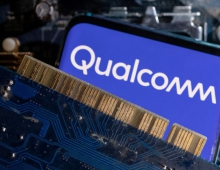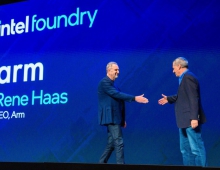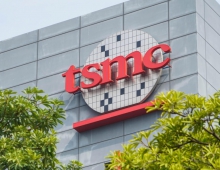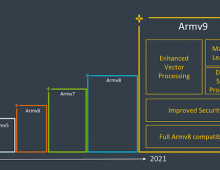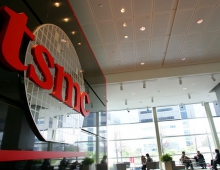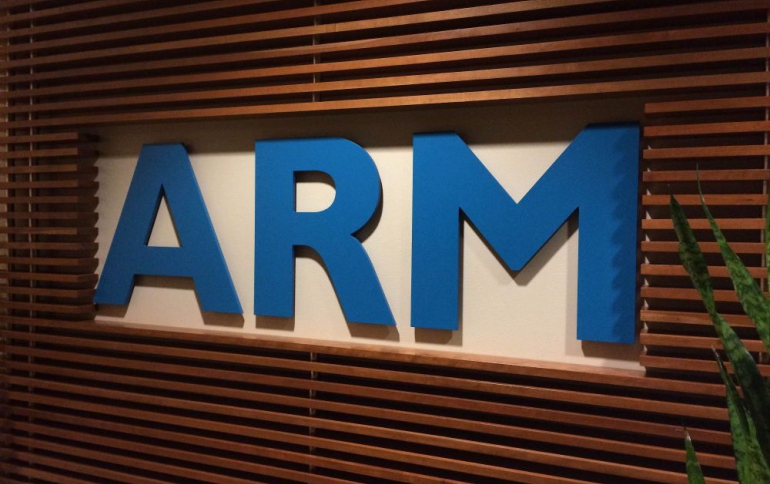
ARM And TSMC Validate First Multicore Test Chip Based on 10FinFET Technology
ARM today announced it has tapped out the first multicore, 64-bit ARM v8-A processor test chip based on TSMC's 10FinFET process technology. According to ARM, simulation benchmarks show impressive power and efficiency gains relative to TSMC's 16FinFET+ process technology, which is currently used to implement chips powering many of today's premium smartphones.

The ARM test chip used four of 'Artemis' cores running at 2.8 GHz, an unknown GPU and memory subsystem among other components.
Compared with a Cortex A-72 on TSMC’s 16FF+ process, the 10nm SoC operating on the same frequency showed a 0.7%, 11% and 12% improvement in performance depending on the use of overdrive which ARM defines as nominal + 100 mV. Eventually, 10nm chips should show a 30% improvement in power consumption compared with its predecessors.

"Artemis is a small core, so you’re going to get some architectural benefits in leakage, just as much frequency, better power and smaller [size]," said Ron Moore, vice president of marketing for ARM’s physical design group. "Performance between Artemis and an [existing] A-72 [core] are going to be pretty much at the same level."
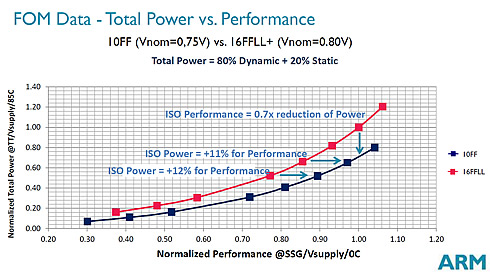
The successful validation of the test chip is an important milestone in ARM and TSMC's collaboration. The fully validated complete design enablement solution includes IP, EDA tools, design flow and methodology to enable new customer tape-outs on TSMC's most advanced FinFET process. In addition, SoC designers can now use the foundation IP building blocks (standard cell libraries, embedded memories and standard I/Os) to develop competitive SoCs for the highest possible performance with lowest power and area.
The latest test chip is the result of ARM and TSMC's commitment to advanced process technologies, building on the initial 10FinFET partnership announced in October 2014. Mutual ARM and TSMC silicon partners have also benefitted from early access to ARM Artisan physical IP and 16nm FinFET+ tape-outs of the ARM Cortex-A72 processor.
Besides TSMC , ARM is also is working with Samsung as its foundry aggressively pushes toward its own 10nm FinFET process.
Focusing on future data center chips
TSMC and ARM are also working together to compete with Intel in the growing market of data center chips.
TSMC controls a 55% share of the global chip market and it will be the sole supplier for Apple's new iPhone 7.
Intel has so far maintained a tight grip on the data center sector with a 99% market share. That may change soon with TSMC's ferocious attempt to break into the field.
Data centers are playing an expanding role in emerging future technologies including artificial intelligence, machine learning, driverless cars and drones. These new technologies depend on data centers to capture, process and analyze huge volumes of data.
Last March, TSMC and ARM announced they would jointly develop the most advanced 7- nanometer chips to expand beyond mobile applications and into next-generation networks and data centers. TSMC will begin mass production of 7 nanometer chips in the first half of 2018.

